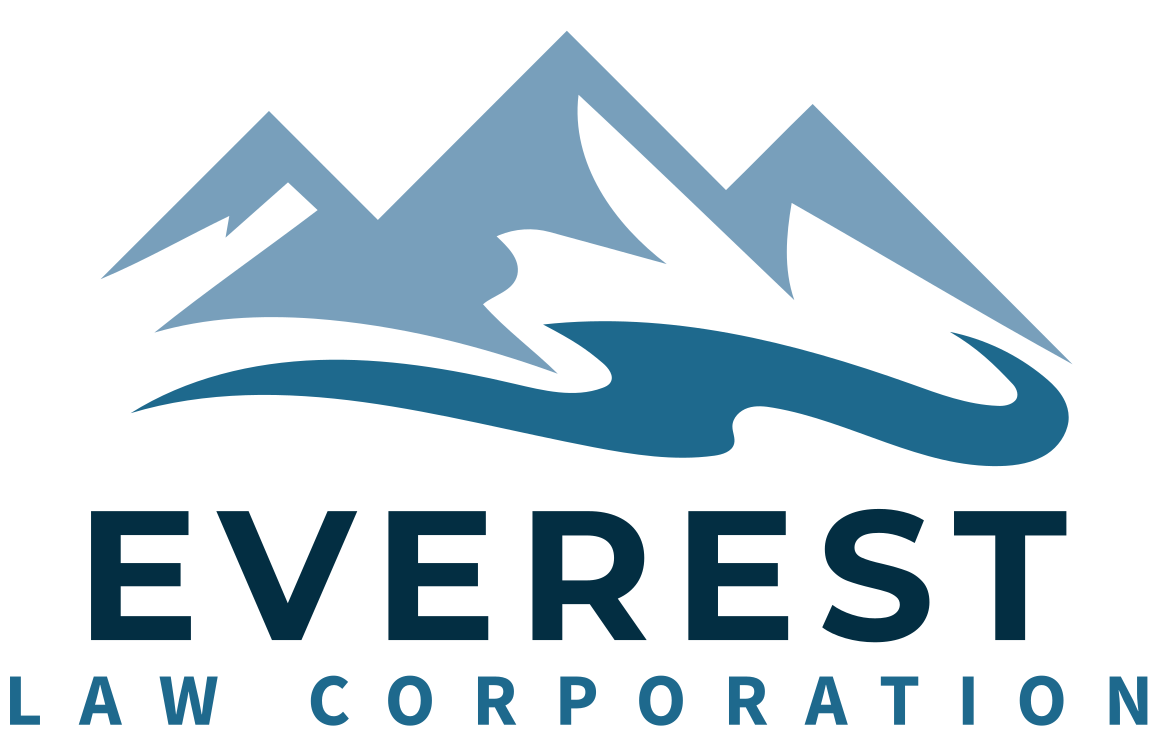Kelowna Business Lawyer
Business Law Affects All Businesses
From hospitality to financial services to manufacturing and retail, Kelowna stands at the center of a thriving business community in the Okanagan valley. Did you know: as of 2016, Kelowna was the Canadian city with the highest level of self-employment according to Statistics Canada? This means that Kelowna has a nurturing ecosystem for businesses and a palpable entrepreneurial spirit.
One key to success for any B.C. business, society or not-for-profit organization is navigating the sometimes complex web of laws and regulations – federal, provincial and municipal – that govern how to set up, start, manage, run, close or buy and sell each enterprise. Business lawyers advise businesses on their numerous legal rights, responsibilities and obligations.
Working With Elise Everest
The term “business lawyer” usually refers to a lawyer who solves problems for their clients, guides their clients through transactions, and provides legal advice prior to representing a client in court. Lawyers who are experts in dispute resolution through the court process are usually referred to as “commercial litigators”. In fact, many businesses consult with a business lawyer for the purpose of avoiding future litigation. While Elise Everest of Everest Law Corporation LLP is a business lawyer who provides strategic advice to mitigate the time, energy and money that relates to a dispute, sometimes the process of dispute resolution is unavoidable. In those cases, Elise would be happy to refer you to one of the many talented commercial litigators who are her colleagues at Everest Law Corporation LLP.
The fundamental role of a business lawyer is to help you achieve your business objectives by determining what result you need (which may be different from the result that you say that you want) through understanding the industry and business environment in which you operate as well as the challenges presented by what you can and cannot do legally.
Elise Everest aims to understand your business perspective without losing a legal perspective. She will add value to the process of making decisions about your business by providing legal expertise with a practical approach.
For a consultation with Elise, please call 778-760-3495 or call her assistant
Marija at 250-869-1178.


Corporate and Commercial Law
The scope of corporate and commercial law is multi-faceted. It includes:
- contract law;
- commercial transactions (buying and selling assets and businesses);
- securities law;
- regulation of commercial entities by the laws of company, partnership,
agency,franchising, and consumer protection; - financing;
- leasing;
- licensing;
- employment law;
- privacy law;
- intellectual property law; and
- taxation.
Not everyone can be an expert in every area of corporate and commercial law, which is why it is important to work with a lawyer, such as Elise, who is a part of a team of colleagues, who together, have the wisdom and experience to solve all manner of tough legal problems.
Teamwork and collaboration is part of the culture of Everest Law Corporation LLP. Elise’s philosophy goes further: she believes it is important to become a team with each of her clients, learn to talk in each client’s language, learn what challenges and risks keep the senior management of each client up at night and then together, be proactive, anticipate issues and formulate strategies to address those issues early on.
Areas of Service Offered
Business Formation and Restructuring
Commonly, when first forming a business, entrepreneurs utilize a sole proprietorship business structure or simple partnership. As the business grows, it is important to consider changing its structure if the business begins to outgrow the benefits of its original arrangement.
When determining an appropriate structure, owners should consider any potential liability their business will face, such as:
- paying employees;
- collecting sales taxes;
- paying rent;
- paying a loan or mortgage;
- giving warranties;
- taking deposits or pre-payments;
- occupiers’ liability;
- manufacturers’ or product liability;
- liability for completed work;
- liability for errors and/or omissions; and
- environmental liability.
One of the main advantages to incorporating a business is the limited liability associated with an incorporated company. Once incorporated, a company is a separate and distinct entity from its shareholders, which is capable of entering into contracts, owning assets and suing and being sued, independently. Therefore, each shareholder’s liability for the debts of the corporation is limited to the amount of funds invested in the company, unless the shareholder has given a personal guarantee.
Both a sole proprietorship and simple partnership arrangement will expose each owner’s personal assets, such as their family home, to seizure by creditors.
Other forms of restructuring include:
- continuing a company into B.C.;
- capital alterations;
- amalgamations;
- arrangements or proposals;
- estate freeze;
- dissolution; and
- restoration.
Corporate Governance and Procedures
Once incorporated, both B.C. companies and federal corporations must adhere to the structures and processes set out in legislation that deal with how companies are run and the duties and responsibilities of those who run them.
The law relating to corporate governance is extensive. All organizations need some level of governance, both to meet legislative standards and to ensure:
- shareholders, directors, officers and advisors share the same vision for the business;
- there is an appropriate set of controls in place to ensure the business is transparent, can meet its benchmarks, and that disputes between stakeholders can be avoided; and
- someone or some people have the authority and responsibility of making important decisions on behalf of the business.
Effective corporate governance will add value to a business and prepare it for the next stage of its development. However, governance in small companies may differ significantly from practices and procedures in larger, well-established companies.
Elise can assist your business understand its legal, contractual, social, and market driven obligations to its stakeholders, including implementing procedures to provide stakeholders with a level of accountability through disclosure and transparency, developing corporate policies, and providing advice with respect to the role and responsibility of the board of directors.
Elise can also provide guidance and direction regarding both ordinary and special corporate proceedings. Ordinary corporate proceedings will include:
- shareholders’ meetings and resolutions;
- directors’ meetings and resolutions;
- annual reports;
- registered and records office;
- transparency register; and
- entering into contracts.
Special corporate proceedings will include:
- altering the corporate articles.
In any corporate proceeding, observing the requirements of the legislation, the corporate articles, and the shareholders’ agreements (if any) is important to ensure that the proceeding is valid and not open to challenge.
Shareholders’ Agreements
A shareholders’ agreement sets out the business agreement and relationship between each of the shareholders to each other and to the company. It is most frequently necessary or desirable in a privately held company with multiple shareholders, particularly if more than one shareholder is involved in the financing and day-to-day management of the company.
A shareholders’ agreement will set out the expectations of the parties as to how the business will operate, how important decisions will be made, how disputes between shareholders will be resolved, and may place restrictions on how the shareholders may transfer their shares.
In Elise’s experience, the preparation of a shareholders’ agreement usually enables Elise to raise issues with the shareholders that they have yet to consider with respect to the conduct of the business. The process of discussion often clarifies the expectations of each party and to set these expectations out in writing to avoid future disputes based on misunderstandings.
A shareholders’ agreement may address the following matters:
- composition of the board of directors;
- the ability of a shareholder to participate in the conduct of the affairs of the company;
- how the operations of the company will be financed and how profits will be distributed;
- restrictions on issuing additional shares;
- restrictions on transferring shares (right of first refusal);
- compulsory buy-outs;
- transfer of shares on death of one of the shareholders;
- what happens if one of the shareholders becomes incapable of working in the business;
- how to deal with a shareholder who defaults on obligations under the agreement;
- how to deal with marital difficulties or family property of a shareholder; and
- income tax consequences.
By executing a comprehensive shareholders’ agreement, shareholders within a company can mitigate the costs that could be incurred if any contentious issues regarding the shareholders’ relationships with one another or with the business becomes the subject of litigation.
Drafting and Negotiating Contracts
Getting good advice about contracts can be critical to the success of a business. Most business owners enter into contracts on a daily basis.
Not only can Elise advise you on standard contracts that your business may use all the time, such as employment-related agreements, service agreements, sales-related agreements, nondisclosure and confidentiality agreements, intellectual property assignment agreements, licensing, leases, disclaimers, releases, and distribution agreements, to name a few, Elise can review contracts that others will ask you to sign. It is important to remember that usually the person who drafts the contract will include clauses in the contract for their own benefit. If you are entering into a contract that is drafted by another, you will want to ensure that it is on reasonable terms and that you fully understand your obligations under the contract as well as your rights and remedies if the other party does not fulfill their obligations.
A well-written business contract clearly sets out the terms of the transaction and also:
- describes what happens if one party does not meet their obligations under the agreement;
- allocates risks between the parties (for example, by limiting the liability of one party);
- makes allowances for circumstances beyond the control of the parties; and
- anticipates problems that might arise and provides a means to resolve the problem.
Elise’s goal when drafting contracts for her clients is to reduce ambiguity. Non-ambiguous contracts are easier to enforce. If dispute proceedings are necessary, non-ambiguous contracts will reduce the time and expense needed to resolve a dispute.
There are a lot of free contract templates available on the internet that are enticing for business owners who are cost-conscious. However, these documents will not be customized for your particular circumstances, you may or may not understand what clauses are in the contract and which clauses are missing, the template may not protect your interests, and it may be drafted based on the laws of another jurisdiction, making some clauses irrelevant, unenforceable or unnecessarily restrictive. By using one of these templates, you may be taking a chance that will have legal consequences.
Everyone wants to save money, but having an experienced lawyer, such as Elise Everest, prepare and review contracts on behalf of your business, can help save you money in the long run, safeguarding you against complications, errors and misunderstandings.
Commercial Financing
Most businesses need to borrow money to carry out their objectives. Whether it is acquiring the assets of another business, purchasing new equipment, buying real estate, expanding into another city, or, in some cases, meeting its operating expenses, there are times when the business itself will have insufficient cash flow for these purposes. Instead, it will arrange a commercial loan.
Once a business has negotiated terms of a loan with a financial institution or other lender, security documents will often be required. Security documents may include:
- a promissory note or other evidence of indebtedness;
- a mortgage;
- a general security agreement creating an interest in the debtor’s present and after-acquired personal property;
- assignment of rents;
- a personal or corporate guarantee; and
- environmental and other indemnities.
In addition to the security documents, a borrower is also expected to make certain representations and warranties to the lender concerning items such as title to assets, prior encumbrances, directors, officers, and authority of the corporation to enter into the transaction. Therefore, an up-to-date corporate records book, land title searches, personal property registry searches and relevant tax searches will also be necessary.
In each loan transaction, Elise makes every effort to work with the lender’s lawyer to be organized and identify issues early, thus ensuring that the transaction proceeds as smoothly as possible. With increasing competition among financial institutions and others to provide financing to businesses, Elise refuses to accept that you should not and cannot make amendments to a lender’s security documentation. She is willing to negotiate changes as required to make certain that you are satisfied with the terms of your financing arrangement.
Commercial Leasing
Neither the Residential Tenancy Act or Manufactured Home Park Tenancy Act of British Columbia apply to commercial tenancies. The law applicable to commercial leasing consists of common law principles as well as a patchwork of legislation, including the Commercial Tenancy Act, which was enacted in 1897 and has not been substantially amended, the Law and Equity Act, the Property Law Act, the Rent Distress Act, the Land Title Act and the Land Transfer Form Act. The fragmentary nature of the body of law in this area has the effect that a number of important and relevant rules are located in case law and statutes other than the Commercial Tenancy Act.
As a result, it is important for landlords and tenants to enter into clear and easy to understand leases that anticipate problems that might arise between the parties and address how to resolve them as a means of avoiding disputes between the parties. Without clear leases, parties are forced to rely upon both complicated and antiquated statutes to set out their legal rights and remedies.
Elise has experience negotiating leases for both landlords and tenants.

Landlords (Leasors)
For landlords seeking to review and update their current leases, Elise is happy to discuss the type of rental structure that best suits your needs as well as clauses in a lease that are essential to protect your interests. However, when negotiating on behalf of a landlord, Elise understands that it is sometimes not in a landlord’s best interest to be uncompromising. Securing a good tenant that is financially healthy with a strong record of business performance or a tenant who is intending to rent the whole of the building or a large amount of space, may bring value to your rental property, simplify administration, and reduce maintenance costs, all of which may entitle the tenant to some lease concessions. Elise can help you determine both the deal-breakers and non-essential terms that can reduce your negotiating time and enhance your relationship with your tenants.
Tenants (Leasees)
From a tenant’s perspective, it is vital to review the lease that has been proposed to you by your landlord and ensure that you understand your obligations. Many tenants sign a lease without carefully considering the costs (above and beyond rent) that they are required to pay under the lease, their restrictions on assigning and subletting and the damages they may incur if they break the lease. Additionally, working with an experienced negotiator will help a tenant know what to ask for from their landlord. Elise is happy to discuss the type of clauses, such as tenant inducements, leasehold improvement costs, competitor clauses, renewal conditions, rights of first refusal to purchase the property or to rent additional space, and termination conditions, that should form your tenant’s wish list.
Franchising
A franchise is a business that is operated by an individual (“franchisee”) who has been granted rights by another individual (“franchisor”) to market goods and services under the franchisor’s business system and tradename, in return for fees and royalties. Basically, the franchisee purchases the franchisor’s “brand” to run their own business.
Franchise law differs in each province and territory in Canada. Therefore, even if you are familiar with franchise law in another province, there will be circumstances where the rules and requirements in British Columbia will not be the same. In British Columbia, franchises are governed by the Franchises Act, which primary purpose is to provide legal protections for B.C.-based franchisees who operate a franchise.
Selling
If you are intending to sell a franchise in B.C. the Franchises Act requires that you prepare a detailed disclosure document to be provided to a prospective franchisee. It also creates joint and several liability between the franchisor, every person who signed the franchise disclosure documents, and others if the franchisee suffers a loss as a result of misrepresentations made in the disclosure documents and franchise agreement or from failure to otherwise comply with the Franchises Act. Elise can assist you in preparing the required disclosure documents under the Franchises Act and provide you with legal advice as to your rights and obligations as a franchisor.
Buying
If you are intending to purchase a franchise in B.C., Elise can assist you to understand the disclosure documents provided to you by the franchisor and can help you negotiate a franchise agreement. Elise can also provide advice to you regarding your legal rights and protections under the Franchises Act, including your right of rescission. When working with potential franchisees, it is Elise’s goal to help you make an informed decision prior to your investment.
For further information with respect to any of the above, please call Elise Everest at 778-760-3495, or call her assistant Marija at
